-
Russia 1861-1926
1897 census
1900 Russian village
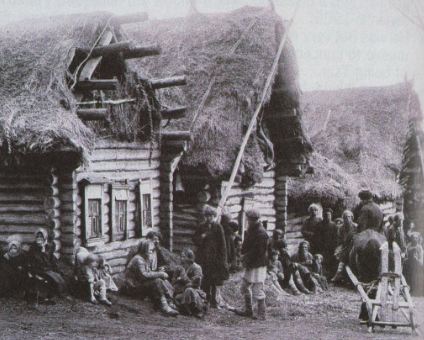
Russia 1901
1903 Factory dormitory Moscow
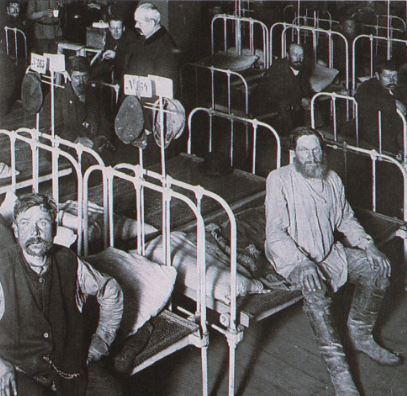
1905 Petition to the Tzar

1905 Bloody Sunday
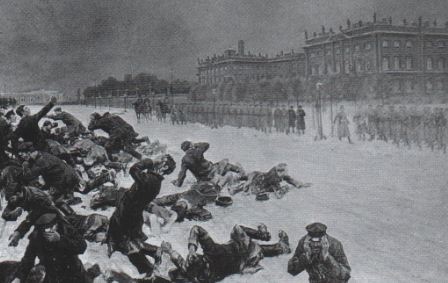
Petrograd police report for Octoher 1916, in response to the Minister of the lnterior’s circular of 1915 asking local police for monthly information on the political situation.
The brilliant success of the offensive of General Brusilov in the spring of the present year and the current solution to the problem of supplying the troops proved convincingly that the task undertaken by the Government and the community has been fulfilled more than successfully. The question of the organization of the army supply may be held to have been satisfactorily settled. (…) But, on the other hand, the disintegration of the rear, that is of the whole country, which is now steadily increasing has today reached such monstrous and extreme form that it has begun to be a menace to the success obtained at the front, and in the very near future promises to throw the country into chaotic, spontaneous and catastrophic anarchy. (…)
All these things have led to an unfair distribution of foodstuffs and articles of prime necessity, an immense and rapid increase in the cost of living, and to inadequacy in sources of supply and means of existence. These factors show that the neglect of the rear is the prime cause of the disorganization of the huge machine of the State, and also contain categorical evidence that a terrible crisis is already on the way and that it must be met in either one way or the other.
The above analysis is entirely confirmed by the extreme anxiety which may be observed everywhere. At the beginning of the present month, September, exceptionally strong feelings of opposition and hostility to the Government were in evidence in every section of the capital’s population… Now, by the end of the month, these hostile feelings, according to reliable evidence, have attained a power among the masses which was without precedent even in 1905-1906.(…)
There is little doubt that rumours that Russia is on the eve of a revolution are exaggerated as compared to the actual conditions, but nevertheless the situation is serious enough to deserve immediate attention.
Video on INA (bottom 1917)
Army in Petrograd feb 1917 Taurid Palace, feb 1917
Taurid Palace, feb 1917
Resolution of the First Provisionnal Government, March 3 1917
The Temporary Committee of the members of the State Duma, with the help and the support of the army and the inhabitants of the capital, has now attained such a large measure of success over the dark forces of the old regime that it is possible for the Committee to undertake the organisation of a more stable executive power.
The actual work of the cabinet will be guided by the following principles :
- An immediate and complete amnesty in all cases of a political and religious nature, including terrorist acts, military revolts and agrarian offences, etc.
- Freedom of speech, press, and assembly, and the right to form unions and to strike and the extension of political freedom to persons serving in the armed forces limited only by the demands of military and technical circumstances.
- The abolition of all restrictions based on class, religion, and nationality.
- The immediate arrangements for the calling on the Constituent Assembly on the basis of universal, equal and direct suffrage and secret ballot, which will determine the form of government and the constitution of the country.
- The substitution of a people's militia for the police, with elective officers responsible to the organs of local self-government.
- Elections to the organs of local self-government are to be held on the basis of universal, equal and direct suffrage and secret ballot.
- Those military units which took part in the revolutionary movement shall be neither disarmed nor withdrawn from Petrograd.
- While preserving strict military discipline on duty and during military service, the soldiers are to be freed from all restrictions in the exercise of those civil rights which all other citizens enjoy.
The Provisional Government wishes to add that it has no intention whatsoever of taking advantage of the military situation to delay in any way the carrying through of the reforms and the measures outlined above.
Source: Izvestiia, 3 March 1917.
Russsians on the front, spring 1917
The April Theses
1 In our attitude towards the war, which under the new government of Lvov and Co. unquestionably remains on Russia’s part a predatory impertalist war owing to the capitalist nature of that goverment, not the slightest concession to revolutionary defencism’ is possible (…)
2 The specific featurc of the present situation in Russia is that the country is PASSING from the first stage of the revolution which, owing to the insufficient class-consciousness and organisation of the proletariat, placed power in the hands of the bourgeoisie to its SECOND stage, which must place power in the hands of the proletariat and the poorest sections of the peasants (…)
3 No support for the Provisional Government ; the utter falsity of all its promises should be made clear, particularly of those relating to the renunciation of annexations. Exposure in place of the impermissible, illusion-breeding “demand” that THIS government, a government of capitalists, should cease to be an imperialist government (…)
4 The masses be rnade to see that the Soviets of Workers Deputies are the ONLY POSSIBLE form of revolutionary government, and that therefore our task is, as long as THIS government yields to the influence of the bourgeoisie, to present a patient, systematic, and persistent EXPLANATION of the errors of their tactics (…)
5 Not a parliamentary republic — to return to a parliamentary republic from the Soviet of Workers’ Deputies would be a retrograde step - but a republic of Workers’, Agricultural Labourers’ and Peasants’ Deputies throughout the country, from top to bottom.
Abolition of the police, the army and the bureaucracy. The salaries of all officials, all of whom are elective and displaceable at any time not to exceed the average wage of a competent worker.
6 The weight of emphasis in the agrarian programme to be shifted to the Soviet of Agricultural Labour’ Deputies.
Confiscation of all landed estates.
Nationalisation of ALL lands in the country, the land to be disposed of by the local Soviets of Agricultural Labourers’ and Peasants’ Deputies(…)
7 The immediate amalgamation of all banks in the country into a single national bank (…)
8 It is not our IMMEDIATE task to ‘introduce’ socialism, but only to bring social production and the distribution of products at once under the CONTROL of the Soviets of Workers’ Deputies.
Vladimir Ilyich Lenin, Collected Works, vol. 24, 1962.The Decree on Land, issued by the Second All-Russian Congress of Soviets (8 November 1917)
1. Private ownership of land shall be abolished for ever. All land shall become the property of the whole people, and pass into the use of those who cultivate it.
Persons who suffer by this property revolution shall be deemed to be entitled to public support only for the period necessary for adaptation to the new conditions of life
6. The right to use the land shall be accorded to all citizens of the Russian State (without distinction of sex) desiring to cultivate it by their own labour, with the help of their families, or in partnership, but only as long as they are able to cultivate it. The employment of hired labour is not permitted.
In the event of the temporary physical disability of any member of a village commune for a period of up to two years, the village commune shall be obliged to assist him for this period by collectively cultivating his land until he is able to work. Peasants who, owing to old age or ill health, are permanently disabled and unable to cultivate the land personally, shall lose their rights to the use of it but, in return, shall receive a pension from the State.
7. Land tenure shall be on an equality basis. There shall be absolutely no restriction on the forms of Iand tenure-household, farm, communal or co-operative, as shall be decided in each individual village and settlement.
The United States Expeditionnary Forces : Bolshevki killed at Vladavostak 1918
Vocabulary Russia
-
democracy
-
servdom
-
census
-
feodal society
-
jews
-
muslims
-
protestants
-
buddhists
-
catholics
-
orthodoxes
-
absolute monarchy of divine rights
-
authoritarian regime
-
black lands
-
coal and iron mines
-
fields
-
background
-
furniture
-
lack of sanitation
-
Infant mortality rate
-
life expectancy at birth
-
canteen
-
factory
-
dormitary
-
work force
-
political groups
-
far left/right groups
-
mencheviks
-
bolcheviks
-
democrates
-
republicans
-
socialists
-
nobles / nobility
-
parliamentary monarchy
-
Duma
-
constitutiion
-
workers
-
farmers
-
soldiers
-
minimum wage / salary / income
-
amnesty
-
provisional governement
-
welfare state
-
amnesty
-
secret ballot
-
abolition of privileges
-
to go on strike
-
to demonstrate
-
lack of rights
-
aborted revolution
-
harvest
-
mutiny
-
headquarter
-
mutineers
-
kulaks
-
mujiks
-
soviets
-
council
-
the Red Army
-
the White Army
-
abolition of private property
-
a coup
-
bourgeoisie
-
law (act in english)
-
decree
-
rationing
-
unfilled equipment
-
a shortage
-
to suffer from
-
famine
-
starvation
-
totalitarian regime
-
requisition
-
Commentaires
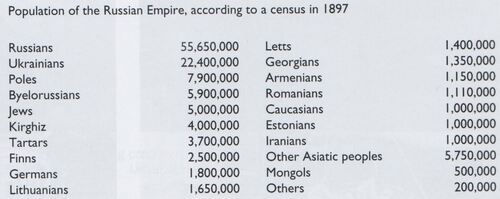


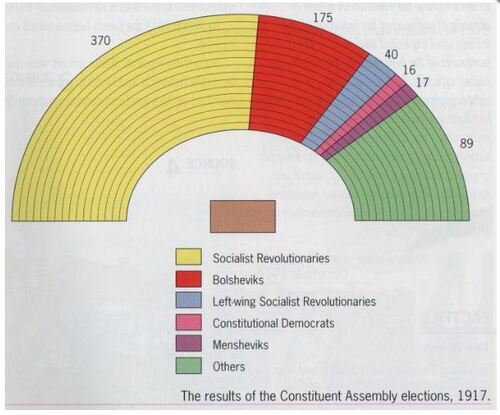

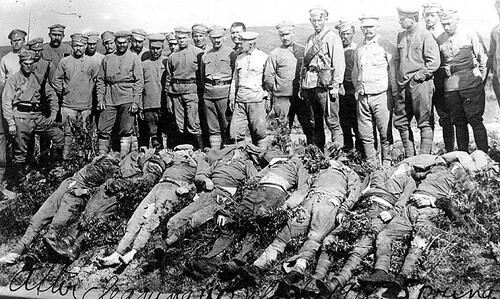



What a BULL SH*T ! Or even hutzpah! )) LOL
There were NO "ukrainians" and "byelorussians" in Russian Empire till 1917 year. Only russians!
Take a guess who invented them and for what?